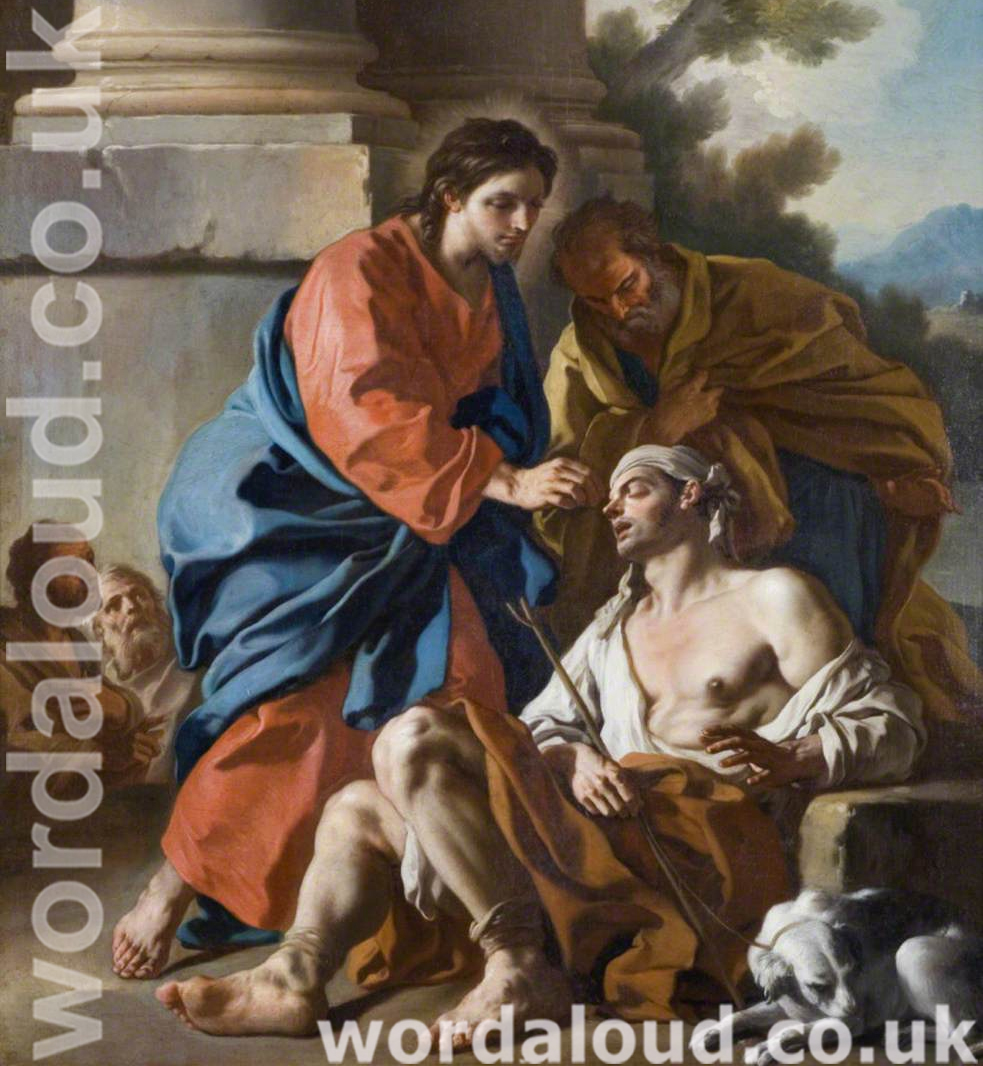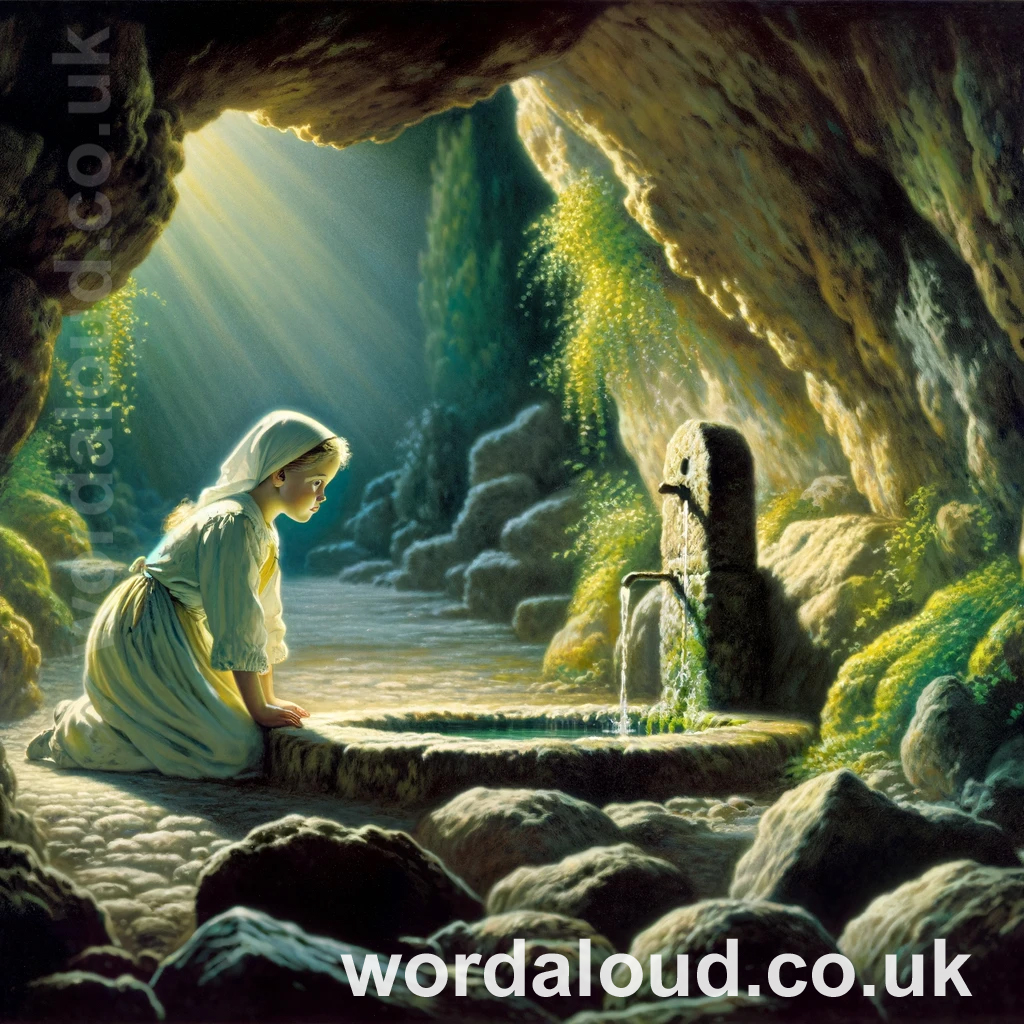Christian Art | A Boy At Prayer With Jesus In The Eucharist
Office Of Readings | Eastertide Week 3, Thursday | A Reading From The Treatise Of Saint Irenaeus Against The Heresies | The Eucharist Is The Guarantee Of Salvation
‘The eucharist is the guarantee of salvation.’
The Eucharist And Resurrection Of The Flesh | Saint Irenaeus, Sacramental Realism, And The Glory Of The Body’
The text from Saint Irenaeus, read on Thursday of the third week of Eastertide in the Office of Readings, is a profound theological meditation on the relationship between the Eucharist and the resurrection of the body. It stands not merely as an apologetic against heresy, but as a luminous witness to the Church’s sacramental and eschatological faith—rooted in the Incarnation, expressed through liturgy, and fulfilled in the resurrection.
Combating Gnosticism | Defence Of The Flesh
Saint Irenaeus of Lyons wrote Against the Heresies in the second century to confront the growing influence of Gnostic teachings, especially among groups like the Valentinians. These movements claimed that the material world was the result of a lesser, ignorant deity and that salvation meant escape from the physical realm. According to them, the body was a temporary prison and had no part in eternal life.
Irenaeus’s argument is a direct and systematic refutation of this worldview. If Christ truly redeemed us, then He must have assumed and sanctified the full reality of human nature—including the body. He asks pointedly: if the flesh is not saved, then what did Christ die for? What is the meaning of the blood He shed?
This insistence on the redemption of the body is not simply about defending Christian doctrine—it’s about affirming the goodness of creation and the reality of God’s love manifest in history. For Irenaeus, salvation is not the rejection of creation but its restoration.
Eucharistic Realism | More Than Symbol
Central to Irenaeus’s theology is the Eucharist, not merely as a memorial meal or symbolic act, but as the real presence of Christ—body, blood, soul, and divinity. Irenaeus asserts that the bread and wine, fruits of creation, become truly the Body and Blood of Christ when they receive the Word of God. This echoes what we find in Justin Martyr and in the Didache: early Christian sources that describe the Eucharist as a sacrifice and as the ‘medicine of immortality,’ a term also found in Ignatius of Antioch.
Irenaeus’s language is strikingly realistic. The Eucharist, he says, is what nourishes our actual bodies—our flesh and blood—thereby preparing them for resurrection. There is no hint of abstraction. The bread is not like His body; it is His body. The chalice is not a symbol of His blood; it is His blood. This is no mere rhetorical device, but a deeply sacramental vision rooted in the Incarnation itself: if God became flesh, then matter can become a bearer of divine life.
Scriptural Grounding | Flesh, Blood, And Life
Saint Irenaeus anchors his argument in Scripture, particularly Ephesians 5:30 (‘we are members of his body, of his flesh and bones’) and 1 Corinthians 15, where Saint Paul elaborates on the resurrection. Irenaeus resists any spiritualizing of these passages. When Paul says we are members of Christ’s flesh, Irenaeus insists we take this literally—not as spirits or metaphors, but as people who are bodily united to Christ through the Eucharist.
This connection is not accidental. Jesus Himself taught in John 6: ‘Unless you eat the flesh of the Son of Man and drink His blood, you have no life in you.’ Irenaeus takes this at full weight. The Eucharist is not a mere fellowship meal—it is divine sustenance, the life-giving flesh and blood of the risen Christ.
Sacrament As Seed | Agricultural Imagery And Resurrection
Irenaeus’s final section evokes agricultural imagery that links the Eucharist to the resurrection of the body. He describes a vine cutting planted in soil, grain that falls and decays only to rise in abundance—symbols rooted in both nature and the Gospel (cf. John 12:24). These metaphors speak of continuity: what dies is what will rise. There is no disembodied salvation here. The very body nourished by Christ’s Eucharist is the one that will rise.
This idea of the Eucharist as ‘seed’ of the resurrection foreshadows later sacramental theology, including that of Saint Thomas Aquinas, who refers to the Eucharist as viaticum—food for the journey to eternal life—and who emphasizes that it ‘contains in itself spiritually all the effects of the Passion.’
In this sense, the Eucharist is not just a sign of what is to come; it is the instrument of that future. The body, having received the living Christ, becomes capable—by grace—of sharing in His resurrected glory.
Liturgy And Immortality | The Easter Context
The Church places this reading in the heart of Eastertide for good reason. The resurrection of Christ is not just an event of the past; it is the inauguration of a new creation. In the liturgy, especially in the Easter Eucharist, we taste that new life now. The ancient Easter preface proclaims: ‘In Him a new age has dawned, the long reign of sin is ended, a broken world has been renewed.’
What Irenaeus teaches us is that this renewal is not confined to the soul—it extends to the body, the material world, and all of creation. His theology also provides a kind of mystagogical catechesis: newly baptized Christians, nourished by the Eucharist, are being formed not just for moral living, but for immortal life.

A Reading From The Treatise Of Saint Irenaeus Against The Heresies | The Eucharist Is The Guarantee Of Salvation
If our flesh is not saved, then the Lord has not redeemed us with his blood, the eucharistic chalice does not make us sharers in his blood, and the bread we break does not make us sharers in his body. There can be no blood without veins, flesh and the rest of the human substance, and this the Word of God actually became: it was with his own blood that he redeemed us. As the Apostle says: In him, through his blood, we have been redeemed, our sins have been forgiven.
We are his members and we are nourished by creatures, which is his gift to us, for it is he who causes the sun to rise and the rain to fall. He declared that the chalice, which comes from his creation, was his blood, and he makes it the nourishment of our blood. He affirmed that the bread, which comes from his creation, was his body, and he makes it the nourishment of our body. When the chalice we mix and the bread we bake receive the word of God, the eucharistic elements become the body and blood of Christ, by which our bodies live and grow. How then can it be said that flesh belonging to the Lord’s own body and nourished by his body and blood is incapable of receiving God’s gift of eternal life? Saint Paul says in his letter to the Ephesians that we are members of his body, of his flesh and bones. He is not speaking of some spiritual and incorporeal kind of man, for spirits do not have flesh and bones. He is speaking of a real human body composed of flesh, sinews and bones, nourished by the chalice of Christ’s blood and receiving growth from the bread which is his body.
The slip of a vine planted in the ground bears fruit at the proper time. The grain of wheat falls into the ground and decays only to be raised up again and multiplied by the Spirit of God who sustains all things. The Wisdom of God places these things at the service of man and when they receive God’s word they become the eucharist, which is the body and blood of Christ. In the same way our bodies, which have been nourished by the eucharist, will be buried in the earth and will decay, but they will rise again at the appointed time, for the Word of God will raise them up to the glory of God the Father. Then the Father will clothe our mortal nature in immortality and freely endow our corruptible nature with incorruptibility, for God’s power is shown most perfectly in weakness.

Saint Irenaeus of Lyons (c. 130–c. 202 AD)
Saint Irenaeus was a second-century bishop, theologian, and martyr, best known for his powerful defense of orthodox Christian faith against Gnosticism. Born in Smyrna (modern-day Izmir, Turkey), he was likely a student of Saint Polycarp, who himself had been a disciple of the Apostle John, giving Irenaeus a vital link to the apostolic tradition.
He later moved to Gaul (modern-day France) and became the bishop of Lyons around 177 AD. His most famous work, Adversus Haereses (Against the Heresies), systematically refuted Gnostic teachings and laid out a robust theology of the Incarnation, the sacraments, Scripture, and apostolic succession.
Irenaeus emphasized the unity of body and soul, the goodness of creation, and the salvific role of Christ’s real humanity. He was among the first to clearly articulate the concept of recapitulation—that Christ ‘sums up’ all things in Himself to redeem humanity.
He died around 202 AD, likely as a martyr during the reign of Emperor Septimius Severus. In 2022, Pope Francis declared him a Doctor of the Church, calling him the ‘Doctor of Unity’ for his role in defending the true faith and promoting Church harmony.

![]()








